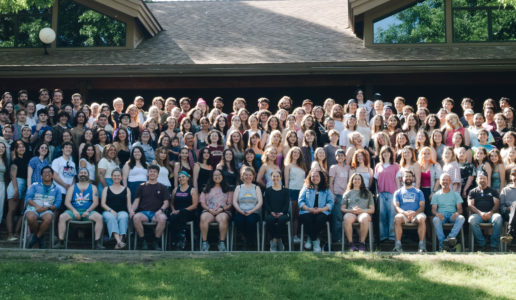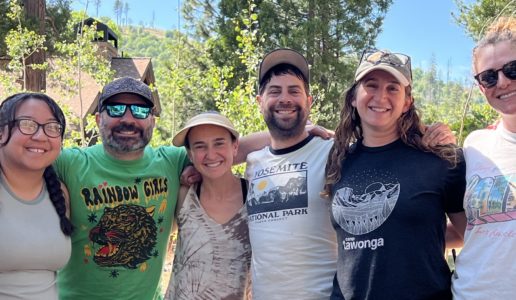Jewish Adulthood: Reflections on 13
By: David “Griz” Griswold
What does it mean to become a Jewish adult these days? And furthermore, what does it mean to transition into Jewish “adulthood” at the ripe old age of 13?
These are some key questions Tawonga’s Bar, Bat & B’nai Mitzvah Program encourages students and parents to ponder.
One of our first adult education sessions in our B’Mitzvah program explores the history of the Bar (and subsequently, Bat and B’nai or B’) Mitzvah. And the truth is, the history of the B’Mitzvah celebration as we conceive of it today isn’t as long as one might think!
The age of 13 isn’t referenced at all in the Torah, and it’s not until Rabbinic times that 13 is designated by the 2nd century C.E. sage Judah ben Temat as the age when “one is ready to do mitzvot” (commandments from the Torah, or as many think of today as good deeds). Of course, it doesn’t take a wild leap of imagination to realize that 13 in an era before TikTok and antibiotics wasn’t exactly the 13 we know today. Ben Temat makes this clear, going on to state that, “At eighteen, one is ready for the wedding canopy; at twenty, one is responsible for providing for a family.” Okay Judah! #2ndCentury #NoRush!
It wouldn’t be until centuries later that the modern B’Mitzvah would begin to take shape. Even our “traditional” vision of a young person leading elements of a Saturday morning Torah service is ultimately a product of our ever-evolving culture, as opposed to a ceremony grounded in rules and laws inherited from the Talmud or Torah.
While very few hard and fast “rules” in Jewish tradition guide what a B’Mitzvah ceremony should entail, embracing 13 as the age when “one is ready to do mitzvot” is one of the few requirements we have for students going through Tawonga’s B’Mitzvah Program.
In the second year of our program, we ask our students to look out into their communities and into the wider world and to consider, “What is here that can be healed?” Furthermore, they ask themselves, “What part can I play in that repair?” The answers they provide are always spectacular to witness—particularly when we gather to hear of their collective ripples at our graduation ceremony, where each graduate speaks of the lessons and impacts of their project in the context of their broader B’Mitzvah journey.
Below is a sampling of some of those stories, as shared by parents and students in our program:
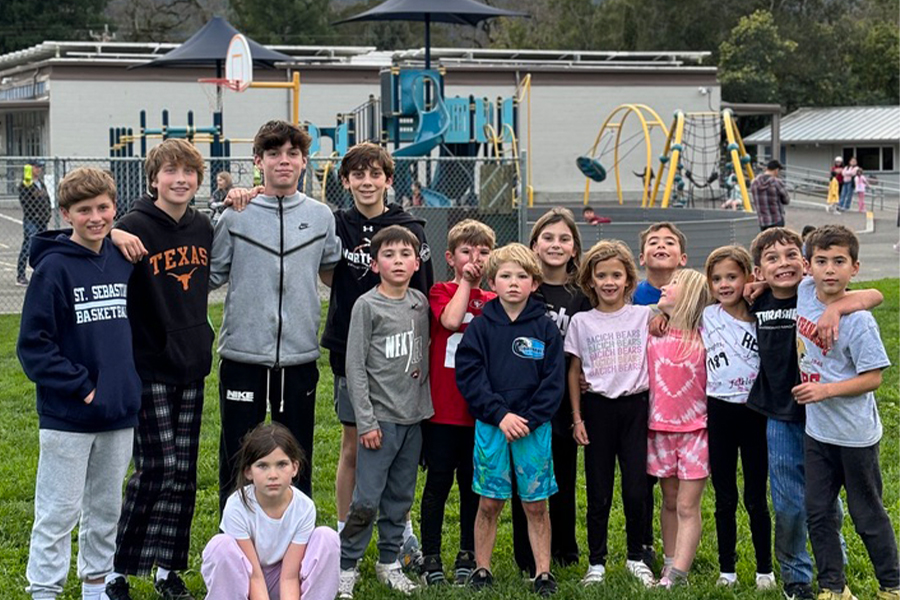 Elliot Harrison raised $1,100 to give to the Mountain Camp Scholarship Fund by creating the “Elliot Games” – an organized after school activity for kids from Elliot’s community between the ages of five and eight. The Games were so popular that he had to cap the attendees, and he raised enough money to help send a student to the Mountain Camp sleepaway camp!
Elliot Harrison raised $1,100 to give to the Mountain Camp Scholarship Fund by creating the “Elliot Games” – an organized after school activity for kids from Elliot’s community between the ages of five and eight. The Games were so popular that he had to cap the attendees, and he raised enough money to help send a student to the Mountain Camp sleepaway camp!
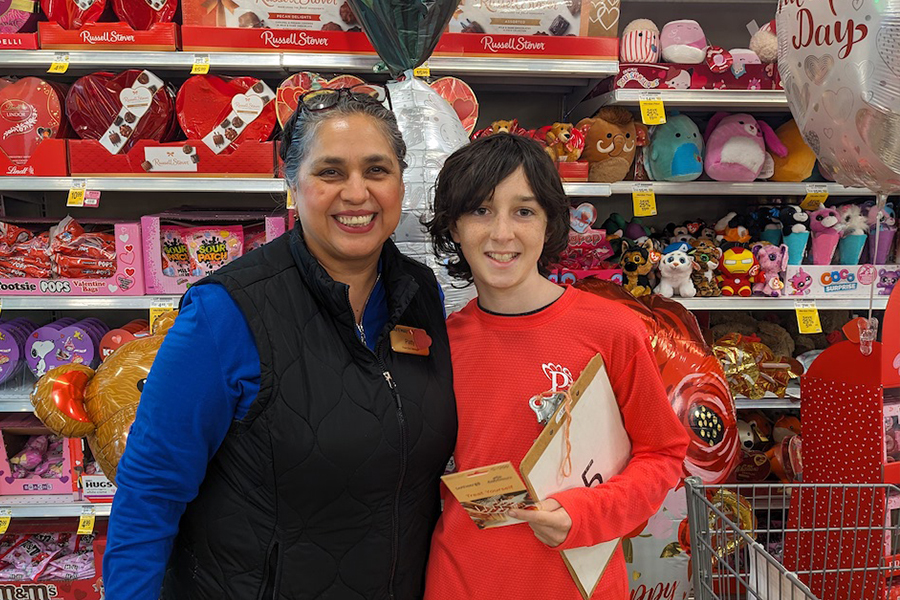
Gabi Stein noticed that many kids in Oakland are recent immigrants from other countries, and he wanted to make sure they felt welcome in Oakland. He asked stores to donate school supplies and toiletries so he could make “Welcome to Oakland!” kits for kids who have just immigrated.
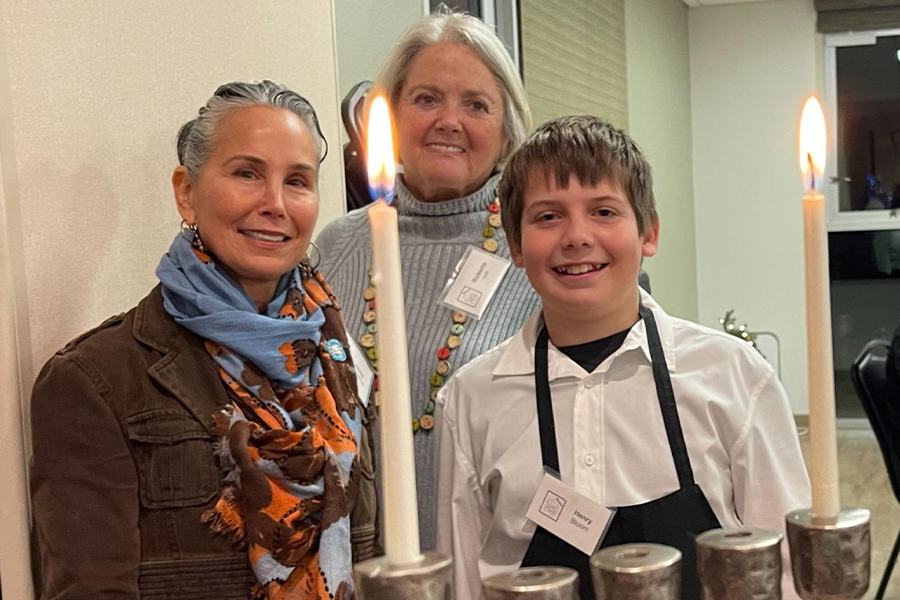 Henry Bloom volunteered twice a month at Table of Plenty in Half Moon Bay as a server to those in need. He helped lead the Chanukah prayers at their Chanukah dinner and really enjoyed connecting with people, especially the seniors.
Henry Bloom volunteered twice a month at Table of Plenty in Half Moon Bay as a server to those in need. He helped lead the Chanukah prayers at their Chanukah dinner and really enjoyed connecting with people, especially the seniors.
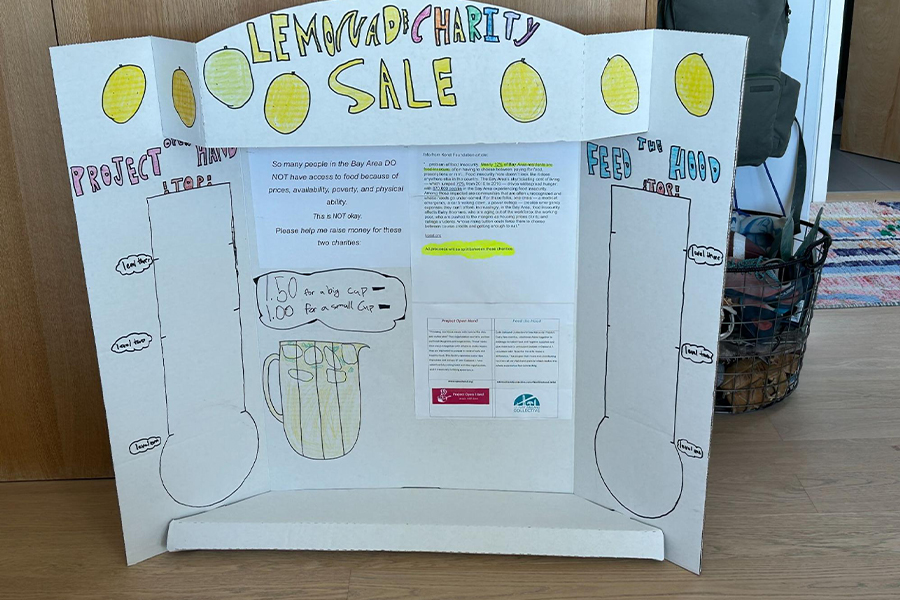 Alder Pomerantz’s project addressed food insecurity in the Bay Area through direct service, education and fundraising. He volunteered with Feed the Hood, Project Open Hand and Alameda County Food Bank to assemble and distribute hygiene kits and lunches, and to assemble food bags for later distribution.
Alder Pomerantz’s project addressed food insecurity in the Bay Area through direct service, education and fundraising. He volunteered with Feed the Hood, Project Open Hand and Alameda County Food Bank to assemble and distribute hygiene kits and lunches, and to assemble food bags for later distribution.
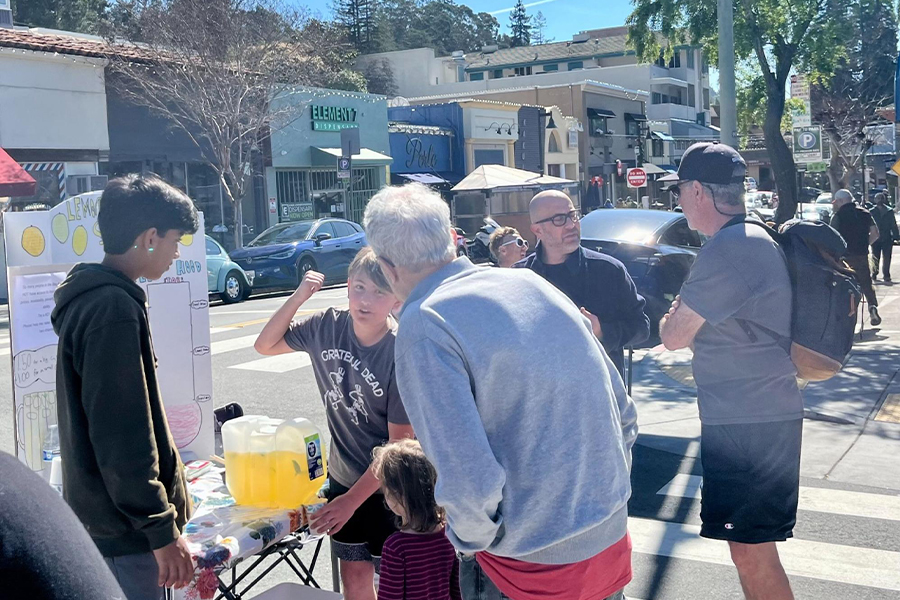 He also ran a lemonade stand at a farmer’s market to raise money for the organizations and to raise public awareness. The vendors at booths all around him joined the cause by encouraging people to donate, creating a really special community moment of support that reinforced his effort and vision.
He also ran a lemonade stand at a farmer’s market to raise money for the organizations and to raise public awareness. The vendors at booths all around him joined the cause by encouraging people to donate, creating a really special community moment of support that reinforced his effort and vision.
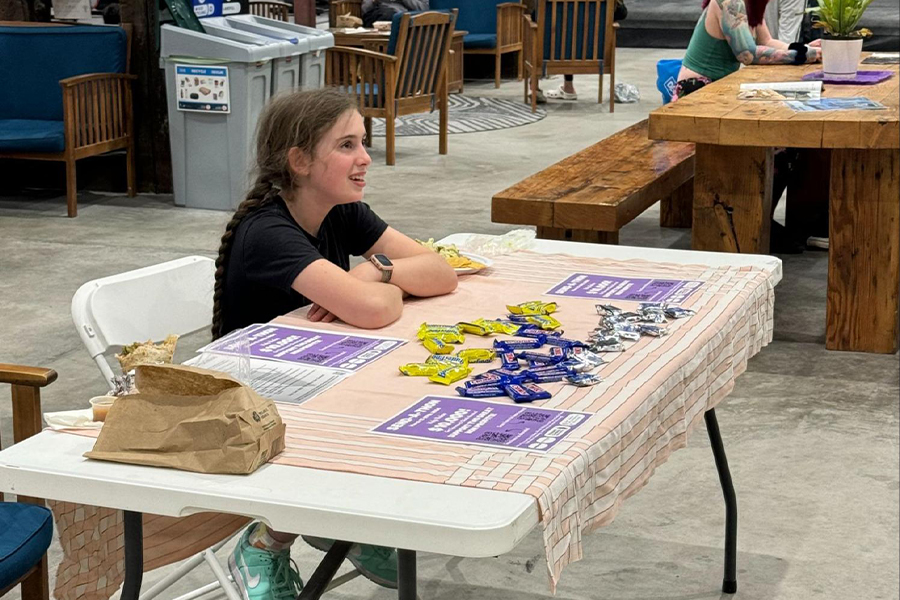
Neela Greene created a fundraiser called Send-A-Thon to combine her love of climbing and the outdoors with raising money for two non-profits: Bay Area Wilderness Training and Yosemite Climbing Association.
She created a website to educate others about these two groups, and succeeded in raising $910 to support their work. Her GoFundMe is still active if you’d like to support Neela in her Mitzvah project!
Yasher koach to our impressive graduates on all that they’ve learned and accomplished! We are proud of them and their families for choosing to embrace a vision of Jewish adulthood, at 13, that centers Tikkun Olam (repairing the world) and engagement in community. We can’t wait to see how they continue to heal our world.
Take a peek into last month’s B’Mitzvah retreat and graduation. If you’re interested in learning more about Tawonga’s B’Mitzvah program, we’d love to meet you and speak with you! We’ll be hosting virtual information sessions this summer, and would love to see you there:
- Thursday, June 13, 7-8pm (Register here)
- Sunday, August 4, 9:30-10:30am (Register here)
- Wednesday, August 14, 7-8pm (Register here)
You can also learn more on our website.
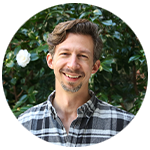 Griz first joined the Tawonga team back in 2009, when he leapt from a job at Google to work as a wilderness leader up at Camp, taking bunks of campers in the backcountry of Yosemite. He now oversees Tawonga’s year-round Bay Area programming, helping to run Tawonga’s B’Mitzvah Program as well as the Tawonga Family School, for families with kids ages 4 to 10. When he’s not working at Tawonga, you might find him playing guitar at a wine bar, up on stage with his punk band, or writing silly children’s poetry.
Griz first joined the Tawonga team back in 2009, when he leapt from a job at Google to work as a wilderness leader up at Camp, taking bunks of campers in the backcountry of Yosemite. He now oversees Tawonga’s year-round Bay Area programming, helping to run Tawonga’s B’Mitzvah Program as well as the Tawonga Family School, for families with kids ages 4 to 10. When he’s not working at Tawonga, you might find him playing guitar at a wine bar, up on stage with his punk band, or writing silly children’s poetry.
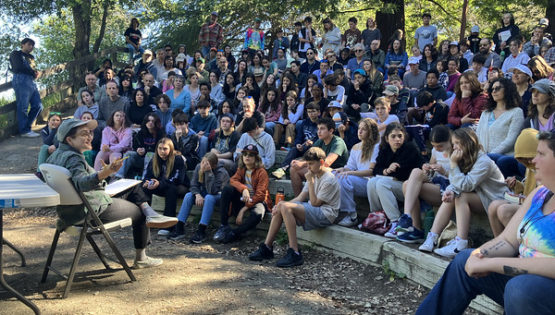 2024 B'Mitzvah Program Graduation
2024 B'Mitzvah Program Graduation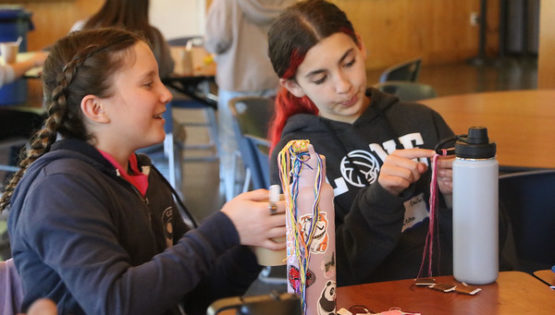 Friendship bracelets during Shabbaton floats
Friendship bracelets during Shabbaton floats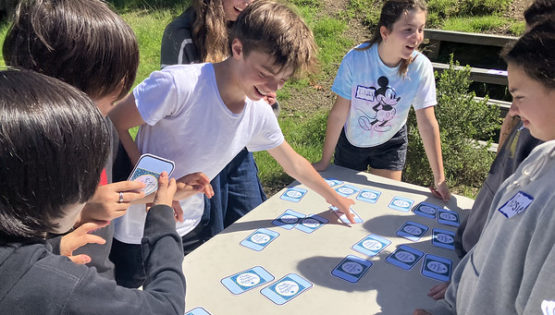 Jewish learning rotations: Passover matching activity
Jewish learning rotations: Passover matching activity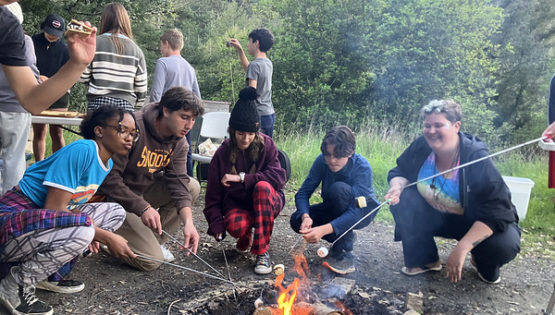 What better way to kick off Havdalah than . . . s'mores!
What better way to kick off Havdalah than . . . s'mores!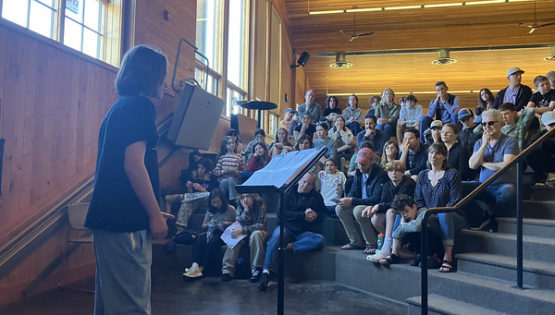 A student shares a graduation speech about their Mitzvah project and B'nai Mitzvah journey
A student shares a graduation speech about their Mitzvah project and B'nai Mitzvah journey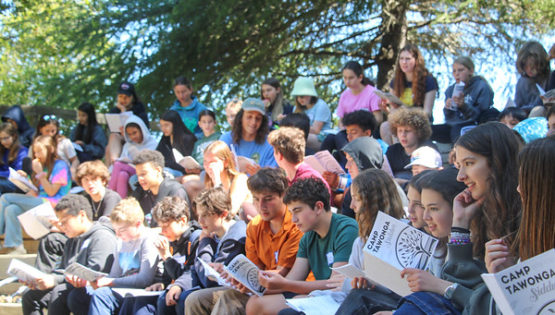 Torah service at our B'Mitzvah Program Spring Shabbaton
Torah service at our B'Mitzvah Program Spring Shabbaton





